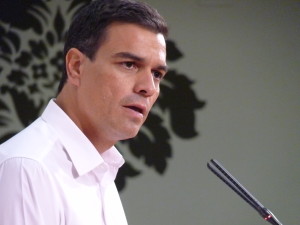State of Spain's Government Uncertain
Spain’s minority Socialist Coalition has until March 3 to propose a viable candidate for Prime Minister, deputies of the Spanish government announced on February 15. Spain’s government has been in flux since December’s parliamentary elections, during which the Popular Party (PP) won a plurality of 123 seats but failed to secure a majority in the lower house. The Socialist Party (PSOE) came in second, winning 90 of the 350 available seats. Mariano Rajoy, Spain’s current Prime Minister and the leader of the Popular Party, appeared to have assumed control of Spain’s government following December’s elections. However, Rajoy rebuffed a request from King Felipe VI that Rajoy form a new coalition government on the grounds of Popular Party’s failure to win a majority of seats in the election. Prior to King Felipe VI’s request, no other parties had expressed any interest in backing Rajoy, which made it unlikely that he would win the support of Spain’s parliament and people.
In a statement released after several weeks of talks with other party leaders, King Felipe VI reaffirmed his commitment to finding a solution. Now, according to EU Observer, the King has called on Pedro Sanchez, the head of the opposition Socialist Party, to spearhead talks with Spain’s other political parties, excluding Rajoy’s Popular Party.

Sanchez hopes to become the nation’s seventh prime minister before King Felipe’s March 3 deadline,, according to The Guardian. Since his party won 90 seats, Sanchez will need the endorsement of multiple other parties to attain the 176 seats necessary for a majority. If the Podemos, the United Left and the Prime Ministers of Spain’s Catalan and Basque provinces endorse Sanchez, he could bridge the gap and gain a majority.
Pablo Iglesias currently leads the Podemos Party (English for “We Can Party”), an anti-austerity party In an interview with El Pais on February 6, Iglesias expressed his wish that “the Socialists, Podemos and the smaller United Left build a government of change.” Iglesias added, “There is no more time for hesitation. Either you’re for change or for stagnation and impasse.” However, just a few days earlier, Iglesias had actually refused to meet with Sanchez unless he permitted exclusive talks between the Podemos and Socialist parties.
Since democracy was only restored in Spain in 1978, many critics view this tumultuous path towards governance as a consequence of Spain’s relatively limited experience with the democratic process.
Structural instability in the government notwithstanding, King Felipe’s deadline is rapidly approaching. Spanish law mandates that if no party can form a new government within two months of elections, new ones must be held. Therefore, should Sanchez fail to acquire the necessary support from Parliament and other parties, Spain will undergo new elections on June 26, at which point the nation will have been without a leader or formal government for almost 200 days.
Note: This article appeared in an abridged format for print on February 23, 2016.
